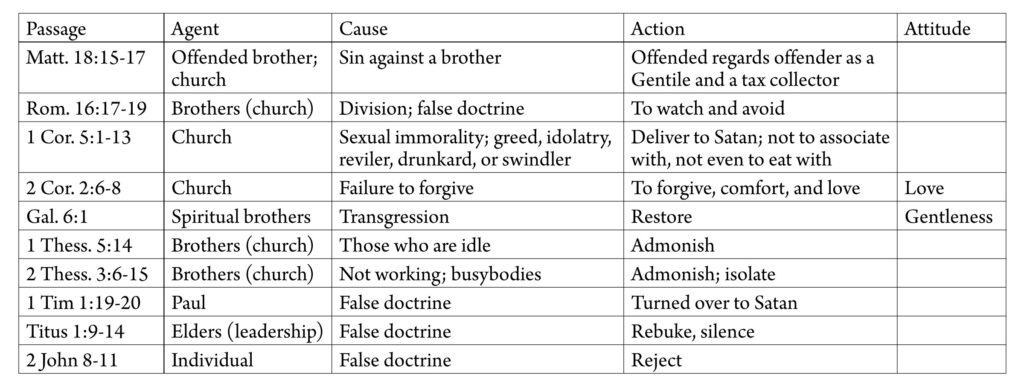The subject of church discipline is not a pleasant topic. It is rarely talked about, almost never preached, and even more infrequently applied.1 Despite the neglect, it is a biblical doctrine exemplified in the Old Testament and taught and practiced in the new. In this article we will look at the rationale for church discipline, an important distinction, some general principles, and practical observations from the texts.
Rationale for Church Discipline
In the Old Testament Israel was God’s representative on earth to show forth His character to the nations. When Israel failed and brought reproach to the name of God, God sent prophets to call the nation to repentance. When Israel failed to repent God sent judgment with the northern tribes taken away captive by Assyria and the southern tribes by Babylon. Even though they were judged they were still His people. The judgments were corrective judgments—a strong message to put their lives in alignment with God’s truth.
While the New Testament introduces us to the church and a dispensation of grace, the principle remains that sinful behavior on the part of God’s people cannot be overlooked. The rationale for church discipline is clear: the holiness of God.
Important Distinction
It is important to observe at the beginning that nothing in church discipline in any way threatens the eternal destiny of the believer. The subject is discipline, or correction of believers. The destiny of the believer is eternally settled when they place their trust in the finished work of Christ on the cross. But, during one’s experience on this earth, the believer is to manifest the image of Christ in their life. When that image is marred by sin it is a reproach to God and cannot be ignored.
General Principles
New Testament correction may be either direct or indirect. First Corinthians 11:32 seems to indicate a direct judging of sin by God. Verse 30 says that many were weak and sick, and some had even died because they were ignoring sin in their lives. Of course, this type of correction could only be implemented directly by the Lord, and to be sure that we don’t miss that point, the passage explicitly says that they were being chastened by the Lord. Probably the most familiar passage of direct discipline is Hebrews 12:5-11 where we are exhorted not to “regard lightly the discipline of the Lord, nor be weary when reproved by him.”
Indirect correction seems to be indicated also in 1 Corinthians 11, and in 1 John 1:9. In these passages the person under the prodding of the Holy Spirit recognizes his sin, confesses it and is forgiven. The word “confess” means “to speak the same thing, or to agree with.” So then, confessing one’s sins is agreeing with God that their acts or thoughts were sinful. This action on the part of the believer could be labeled as a type of self-disciplining or correction.
It is the responsibility of the local assembly to exercise delegated correction. Here the Lord entrusts to believers the responsibility to exercise appropriate discipline. I see two aspects here, proactive, and actual. Proactive would involve the leadership and the local group of believers in discouraging sin in the first place. Preaching that regularly emphasizes doctrine along with principles of Christian living, and a congregation that is in touch with one another and seeks to edify one another will reduce the necessity for actual disciplinary action by the assembly. When that fails of course then the assembly must respond.
Below are ten passages of Scripture that represent New Testament teaching on church discipline. In the chart I have tried to include the essential elements from each passage.

Observations from the Text
1. The only clear step by step process is found in Matthew 18, and yet while it is clear, it is flawed as a pattern for church discipline. The passage describes a personal matter where the church is called upon to arbitrate. All the references to “you,” both before and after the passage are plural. Significantly in verses 15-17 the writer changes the “you” to singular. If the matter is not resolved, the offender becomes as a “Gentile and a tax collector” to the offended, not to the church.2 Nevertheless, the steps involved at least suggest a pattern: individual concern and approach, approach by spiritual leaders, action by the church.
2. While several passages specify particular sins for discipline, Galatians 6:1 simply says: “any transgression.” The word “transgression” is also used by Paul to describe Adam’s sin (Rom. 5:15) and the “delivering up” of the Lord Jesus “for our trespasses” (Rom. 4:25). So, corrective action is not limited to certain sins.
3. Those involved in corrective action include individual spiritual believers, the church, and elders. The important point here is that everyone in the local assembly has a responsibility to maintain the purity of the body. Surprisingly, little is said about the role of the elders. Titus 1:9-14 tells us that they are to “rebuke and contradict false doctrine.” Likewise Acts 20:28 would seem to provide a rationale for their involvement especially in those cases where after the initial approach the brother fails to repent.
4. The actions to be taken range from an initial rebuke to exclusion from the fellowship, to turning one over to Satan, which is taken by some expositors to be the same as exclusion. What is not clear is how the role of the church is to be interpreted. Does the church get to vote on a matter of discipline or are they simply informed by the elders? The local assembly will have to decide this question based on a broader interpretation of New Testament church principles since our text does not clearly specify.
5. Paul’s admonition in 2 Corinthians strongly indicates that the goal of corrective action is restoration with encouragement and love. Of course, this assumes there has been genuine repentance—a definite change of mind and action. How long must the church wait to be sure there has been a change? The text doesn’t say. Galatians 6:1 reinforces the goal of restoration and adds an important quality of gentleness.
A Final Word
Church discipline is mandated by Scripture, but that doesn’t make it easy or pleasant or even always clear as to how it should be applied in individual cases. Many of us have lived that truth and struggled with these issues. What is clear is that it must be done, and done with love and gentleness always with the goal of restoration. Let us remember, brothers and sisters, to encourage and even admonish one another so that we can avoid the more difficult measures. And finally, may God give us all grace and wisdom as we lovingly seek to produce in one another “the peaceful fruit of righteousness” (Heb. 12:11). by Dewitt Jones
Endnotes
- Mark Galli, The Grace of Church Discipline (Christianity Today, December 2016), p.27
- J. R. Littleproud, The Christian Assembly (Grand Rapids, MI: Gospel Folio Press, 2005), p.158

